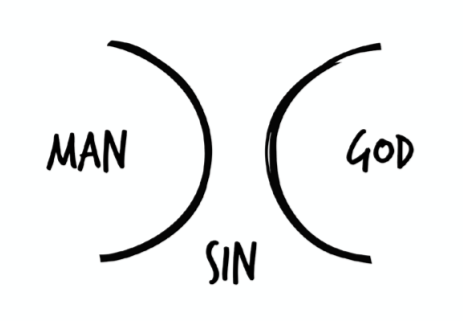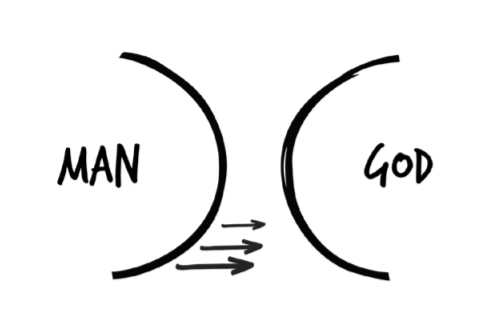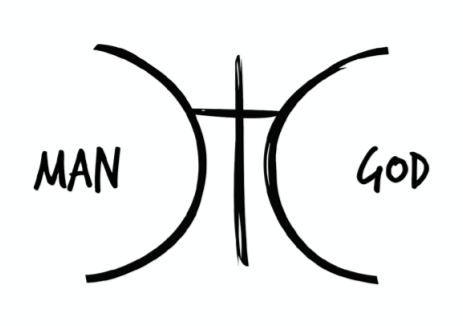As Jesus passed on from there, he saw a man called Matthew sitting at the tax office; and he said to him, ‘Follow me.’ And he rose and followed him” (Mt 9:9).
Consider Matthew the tax collector. Collecting taxes wasn’t simply another profession in the time of Jesus. Tax collectors were responsible for extracting money from people, and they often did so without mercy. They stole from the people, increasing tax rates and pocketing the extra money for themselves. As a Jewish tax collector, Matthew would have been viewed as even worse. Roman rule was a serious problem for the Jews. God had given them the Promised Land, and they were supposed to have their own king, not a Roman emperor. Rome was the enemy, and anyone who stood with Rome was an outcast, a friend of the enemy. That’s Matthew. Matthew is a thief. He’s a traitor. He’s given in to the allure of wealth and of power. When Jesus says to Matthew, “Follow me,” you can imagine the conflict in Matthew’s mind: “Can I really give it up? What about my money, my career?” Yet, at the same time, he longs for something more in life: “Would I be happier? Would life be better if left everything and followed this man? Maybe I don’t have to be a traitor. But can I really change? Do I even want to change? Do I even know this man? What happens if I follow him? What’s it going to cost?” Jesus’ invitation to “follow me” is one that he offers to each of us. And like Matthew, we might feel the tension. Maybe we’ve been there before. Maybe we’re not sure following Jesus is a good decision. Maybe we sense God calling us to something, but we’re afraid of what it might cost. Maybe we’ve done some bad things in the past and don’t think we can change. Whatever our situation, let’s consider Jesus’ invitation to “follow me” and see what it might mean for our lives.
Discuss: Like Matthew, have you ever felt this conflict in your life? How so?
AN INVITATION: FIVE Rs
Jesus’ invitation can be summarized by 5 Rs: Relationship, Rebellion, Reconciliation, Re-Creation, and Response. Let’s look at this message and discover what it might mean for us. As you get started, consider this question:
Discuss: What do you think life is all about?
RELATIONSHIP: WHAT WE’RE MADE FOR
Throughout human history, many answers to the question of the meaning of life have been proposed. But the Christian answer to this question is unique: “God, infinitely perfect and blessed in himself, in a plan of sheer goodness freely created man to make him share in his own blessed life” (CCC 1). Think about that: God did not have any need to create us — he is perfectly blessed in himself. Yet, as the Bible teaches, “God is love” (1 Jn 4:8), and out of love, he freely chose to bring us into existence and fill us with his life, so that he could share his love with us. This is where we find enduring, lasting happiness: in friendship with God as his sons and daughters (Gen 1:26).
Discuss: What do you think of the Christian answer to the meaning of life? Do you think you can have a relationship with God?
REBELLION: THE CHASM
Though we are made for a relationship with God, there is a serious problem: sin.

Sin radically ruptures our relationship with God. We must feel the weight of how devastating the consequences of sin are. As Curtis Martin explains in his book
Making Missionary Disciples,
You are not who you were meant to be. Sin wounded you and separated you from God. Our problem is actually far worse than we might have imagined. At first glance, we may think that, with some effort toward self-improvement, we could close the gap between who we are and who we ought to be. It is simply not the case.
When we fell: The fall was
universal — “All have sinned and fall short of the glory of God” (Rom 3:23). The fall was
severe — “For the wages of sin is death” (Rom 6:23). (1)
God, infinitely perfect and blessed in himself, in a plan of sheer goodness freely created man to make him share in his own blessed life. – Catechism of the Catholic Church 1
The fall created a chasm so great that no human could bridge it, not even with their best effort. The problem of our lives is not primarily found in our circumstances — our family, our boyfriend or girlfriend, the political situation we find ourselves in, our job or anything else that has happened to us. Our problem is sin.
Sin leads to a dilemma: We are made for a relationship with God, yet we are separated from him because of sin. And despite our best efforts, we can’t bridge the gap caused by sin.

Think of what happens in other relationships. When we hurt someone, we have a sense that we should do something — offer a gift of love, a sacrifice, an expression of our sorrow and desire to set things right — so that we can bridge the gap in the relationship. The same is true in our relationship with God. But with God, the gift of love, the bridge, must be so much greater, infinitely greater. As Dr. Edward Sri explains in his book
Love Unveiled,
Our sin entails withholding our love for the God who so completely loves us. We, therefore, should offer God a gift of love that corresponds to the infinite gravity of sin committed against him. But no human being can do that. Not even the most saintly person could offer a gift of love that would atone for the sins of all humanity. Only a divine person could do that. (2)
This is the dilemma. We have a desire for a lasting happiness that only comes from a relationship with God, but we are unable to amend that relationship ourselves. We are finite, and only an infinite love can bridge the infinite gap caused by sin.
Discuss: How have you experienced sin and its effects? How have you experienced this dilemma? In what ways have you tried to “get right with God” on our own, either directly or indirectly?
RECONCILIATION: THE GOD-MAN SOLUTION
So, how can this dilemma be solved? The only way is the God-man solution: Jesus Christ. As God and man, only Jesus Christ can bridge the infinite gap between us and God.
As fully human, Jesus can represent us. He can offer an act of love on behalf of the entire human family.
But because he is also
fully divine, Jesus’ act of love far surpasses anything a mere human could ever offer.

Because of who Jesus is, fully human and fully divine, his total, self- giving love on the cross takes on infinite value. As the God-man, Jesus offers on our behalf an infinite gift of love that restores us to right relationship with the Father. Jesus is the bridge between sinful humanity and the all-holy God.
Discuss: What do you think of the idea of Jesus giving his life for you? Do you believe that Jesus’ sacrifice on the cross can redeem the damage done by sin?
RE-CREATION: TRANSFORMATION IN CHRIST
But there’s more. Jesus came to do a lot more than die on the cross for our sins. If all Jesus did was die on the cross, humanity would have made amends with God, things would be repaired and a right relationship with the Father would be restored. But God loves us so much that he wants so much more than merely a repaired, just, peaceful coexisting relationship with us. He wants our hearts. He wants to make us a “new creation” (3) (2 Cor 5:17).
Curtis Martin explains an image that the Church Fathers gave us for the profound transformation in Christ that God wants to work in our lives:
Imagine a cold steel bar and a hot burning fire. They have almost nothing in common. If you place the cold rod in the hot fire, though, something amazing begins to happen: the rod begins to take on the properties of the fire. It grows warm, it begins to glow — and if you were to take the rod out of the fire and touch it to some straw, it could actually start a fire itself. Now imagine that the fire is God and we are the steel rod. When we are living in Christ … we begin to take on the properties of God. (4)
This is so much more than merely being forgiven of our sins! As Christ fills us with his life, we begin to think like Christ, serve like Christ, sacrifice like Christ. We take on the qualities of Christ. We become more patient, honest, generous, pure and courageous like Christ. As St. Paul explains, we are being changed into Christ’s likeness from one degree of glory to another (2 Cor 3:18).
Take, Lord, and receive all my liberty, my memory, my understanding, and my entire will, all that I have and possess. – St. IGnatius of Loyola
Christianity is not simply a self-help religion, a good way to be a nice person. Nor is it simply about being pardoned by a benevolent deity. At its root, Christianity is about allowing God to change us from within. We recognize our sinfulness and complete helplessness, and we allow God to forgive us, heal us and transform us — so that we can live and love like Christ himself. Jesus has not only died to offer us forgiveness; he has also risen to fill us with his life so that we can be transformed in him.
This transformation takes place in Christ’s Church. It’s through the Church that we truly encounter the living Jesus today and are changed. All that Jesus won for us in his death and resurrection comes to us through the Church, through its teachings and its sacraments. First, the teachings: The Catholic Church hands on the teachings of Christ so that we can be guided by him as our Lord. When we hear the teachings of the Church, we are encountering Christ speaking to us today. Second, the sacraments: The same Jesus who healed the sick, gave sight to the blind and forgave people of their sins continues to touch our lives today through his sacraments. In the sacraments, we encounter the living Jesus who heals us of our own weaknesses, forgives us of our sins and fills us with His Spirit so that our hearts can be made more like his. We encounter Jesus Christ himself in the Catholic Church. It is there that we are invited to follow him and are changed.
Discuss: Do you believe that God can bring about this kind of transformation in your life? What do you think that the idea that God wants to share his life with you and transform you in a specific way through the Church?
RESPONSE: “FOLLOW ME”
Jesus provides an answer that bridges the gap made by sin. Salvation is a gift, freely offered to each of us by God through the Church. The decision to say yes to God’s saving gift means making the fundamental choice to become a disciple of Jesus (i.e. “Follow me”). God’s gift is a complete gift of himself to us and for us; the only appropriate response is a complete gift of ourselves in return. But, like Matthew in the Gospel story above, we can be hesitant. We have questions. We worry about what it might cost. But Jesus doesn’t take away anything that makes life good. If we let Christ enter fully into our lives, if we open ourselves totally to him, are we not afraid that He might take something away from us? Are we not perhaps afraid to give up something significant, something unique, something that makes life so beautiful? … No! If we let Christ into our lives, we lose nothing, nothing, absolutely nothing of what makes life free, beautiful and great … Do not be afraid of Christ! He takes nothing away, and he gives you everything. When we give ourselves to him, we receive a hundredfold in return. Yes, open, open wide the doors to Christ — and you will find true life. (5)
As you consider Jesus’ invitation, one way to think about your relationship with God is in three simple scenarios (illustrated by the images below):\
1. God is not a part of my life. I rule over my life myself.
2. God is a part of my life, but he is not at the center. He’s important and I involve him in my decisions sometimes, but I still rule over my life myself.

3. God is the very center of my life. I surrender my life, my plans and my dreams in his hands, and I seek to do his will and not my own. He is the Lord of my life. He is sitting on the throne of my heart.
Discuss: 1. Looking at these three images, where would you place yourself? Why? 2. Right now, will you make the decision to place Jesus Christ at the center of your life? Will you give your life to him and choose to follow him? 3. (a) If not, what is preventing you from committing your life to Jesus as a disciple? OR (b) If yes, will you pray right now to express your desire to invite Christ more deeply into your life?
Pray together in your own way, or use one of the following prayers from the tradition of the Church:
“Lord Jesus Christ, Son of God, have mercy on me, a sinner” (CCC 435). “Take, Lord, and receive all my liberty, my memory, my understanding, and my entire will, all that I have and possess. You have given all to me. To you, O Lord, I return it. All is Yours, dispose of it wholly according to Your will. Give me Your love and Your grace, for this is enough for me” (St. Ignatius of Loyola).
TAKE ACTION
Discuss: What steps do you need to take to respond to Christ’s invitation? What in your life needs to change? What practical steps do you need to take? See examples below:
- Going to confession
- Beginning to pray daily
- Going to Sunday (or even daily) Mass
- Reading Scripture daily
- Spending time with other Christians
- Joining RCIA
Notes (1) Curtis Martin, Making Missionary Disciples: How to Live the Method Modeled by the Master (Colorado: FOCUS, 2018), 46-47. (2) Edward Sri, Love Unveiled: The Catholic Faith Explained (San Francisco: Ignatius), 91. (3) Pontifical Council for Culture, “Concluding Document of the Plenary Assembly: The Via Pulcritudinous, Priviliged Pathway for Evangelization and Dialogue (2006), accessed November 17, 2020, Vatican.va, III.1. (4) Curtis Martin, Making Missionary Disciples: How to Live the Method Modeled by the Master (Colorado: FOCUS, 2018), 13. (5) Benedict XVI, “Homily of his Holiness Benedict XVI, Imposition of the Pallium and Conferral of the Fisherman’s Ring for the Beginning of the Petrine Ministry of the Bishop of Rome (April 2005),” accessed March 13, 2020, Vatican.va.






